Traveling to Japan can be an incredibly rewarding experience, and while it’s entirely possible to navigate the country without knowing a word of Japanese, learning a few key phrases can significantly enhance your journey. At TRAVELS.EDU.VN, we believe that even a basic understanding of the local language can open doors to deeper cultural immersion and create more meaningful interactions with the friendly locals. Discover essential Japanese phrases for travelers that will make your trip unforgettable.
1. Top 20 Essential Japanese Travel Phrases:
Before diving into detailed explanations, here’s a quick cheat sheet of the most useful phrases you’ll want to have at your fingertips:
| Number | Phrase | Japanese (Romaji) | Meaning |
|---|---|---|---|
| 1 | Hello | Konnichiwa (こんにちは) | Hello |
| 2 | Thank you | Arigatou Gozaimasu (ありがとうございます) | Thank you |
| 3 | Excuse me | Sumimasen (すみません) | Excuse me |
| 4 | I would like __, please | __ o Kudasai (__をください) | I would like __, please |
| 5 | Where is __? | __ wa Doko Desu ka? (__はどこですか) | Where is __? |
| 6 | Gratitude before a meal | Itadakimasu (いただきます) | Gratitude before a meal |
| 7 | Chef’s recommendation | Omakase de (お任せで) | Chef’s recommendation |
| 8 | Alcohol | O-sake (お酒) | General term for alcohol |
| 9 | Japanese sake | Nihonshu (日本酒) | Japanese sake |
| 10 | Non-smoking seat | Kinen Seki (禁煙席) | Non-smoking seat |
| 11 | What time is it now? | Ima Nanji Desu ka? (今何時ですか) | What time is it now? |
| 12 | At what time? | Nanji ni? (何時に?) | At what time? |
| 13 | Morning | Asa (朝) | Morning |
| 14 | Today | Kyou (今日) | Today |
| 15 | Tomorrow | Ashita (明日) | Tomorrow |
| 16 | I want to go to __ | __ ni Ikitai (__に行きたい) | I want to go to __ |
| 17 | Stop, please | Tomete Kudasai (止めてください) | Stop, please |
| 18 | Ticket | Kippu (切符) | Ticket |
| 19 | Bullet train | Shinkansen (新幹線) | Bullet train |
| 20 | Which train? | Dono Densha? (どの電車?) | Which train? |
2. Basic Japanese Words and Phrases
Even mastering a few basic Japanese words and phrases can significantly enhance your travel experience. The Japanese people greatly appreciate the effort of visitors trying to communicate in their language, fostering positive interactions and deeper connections.
2.1. Konnichiwa (こんにちは) – Hello
Konnichiwa is the standard greeting used during the daytime. While ohayou gozaimasu (good morning) and konbanwa (good evening) exist, konnichiwa is a versatile option suitable for most situations.
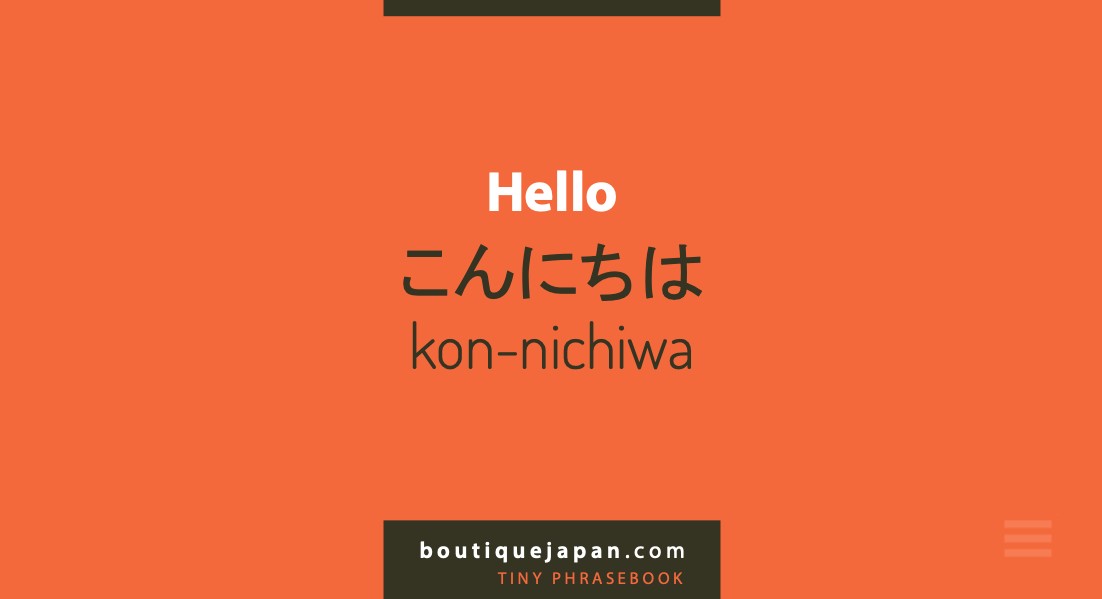 Woman saying Konnichiwa
Woman saying Konnichiwa
2.2. Arigatou Gozaimasu (ありがとうございます) – Thank you
Etiquette is paramount in Japan, making arigatou gozaimasu an essential phrase. The “u” at the end is often barely pronounced, almost silent. A more casual arigatou is usually acceptable.
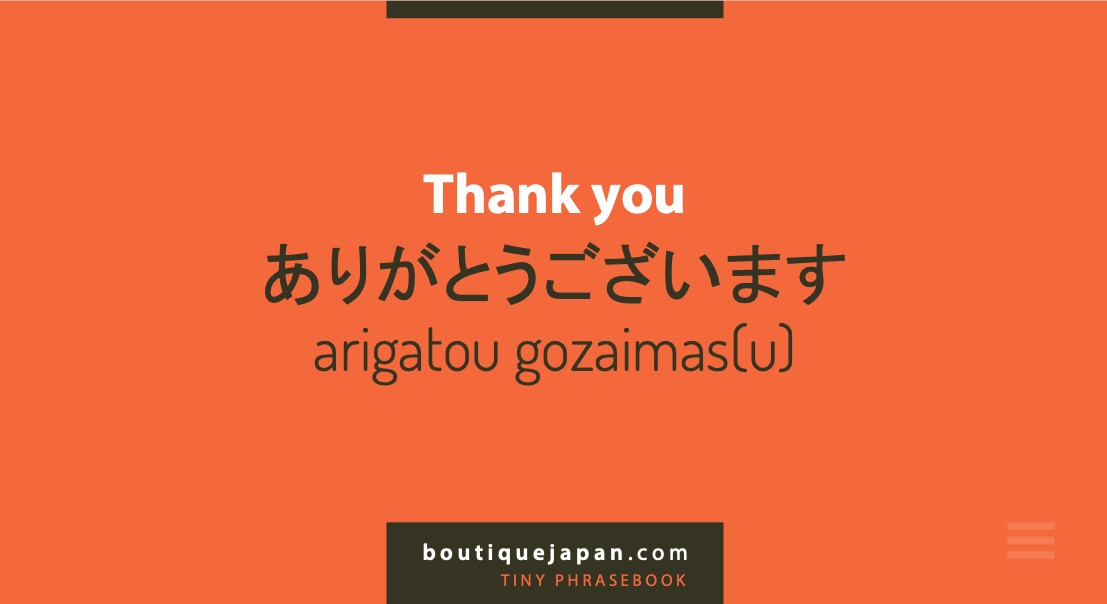 People bowing and saying Arigatou
People bowing and saying Arigatou
2.3. Sumimasen (すみません) – Excuse Me
Sumimasen is a versatile phrase used both to get someone’s attention and to apologize. Use it to call a waiter at an izakaya or to express remorse for a minor mishap.
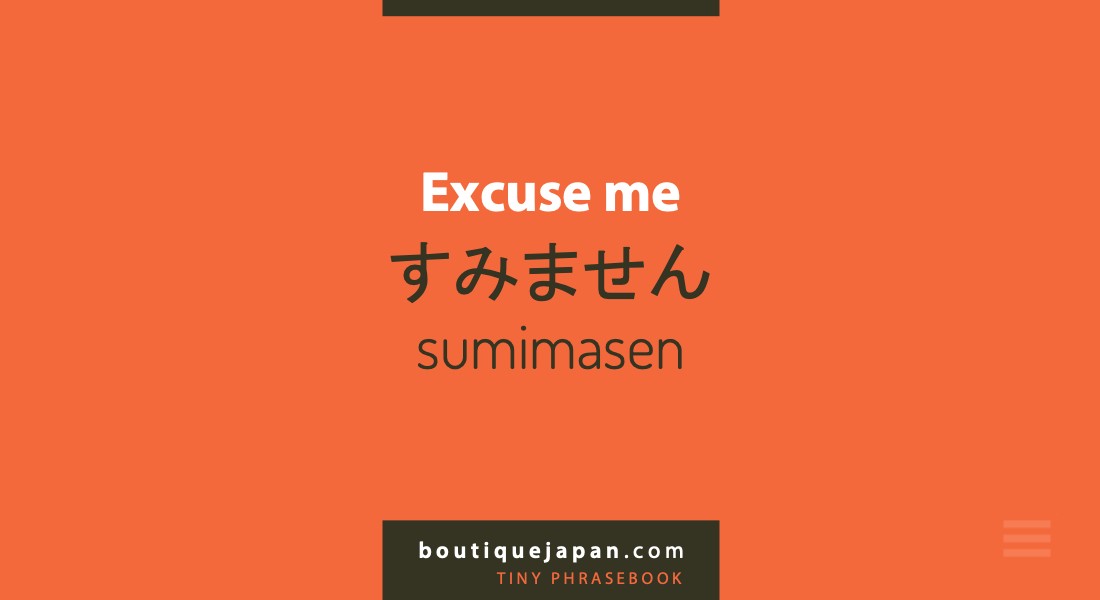 Man apologizing and saying Sumimasen
Man apologizing and saying Sumimasen
2.4. __ o Kudasai ( __をください) – I Would Like __, Please
This phrase is invaluable in restaurants, stores, and various other scenarios. Simply replace the blank with the item you desire, such as mizu (water) or biiru (beer).
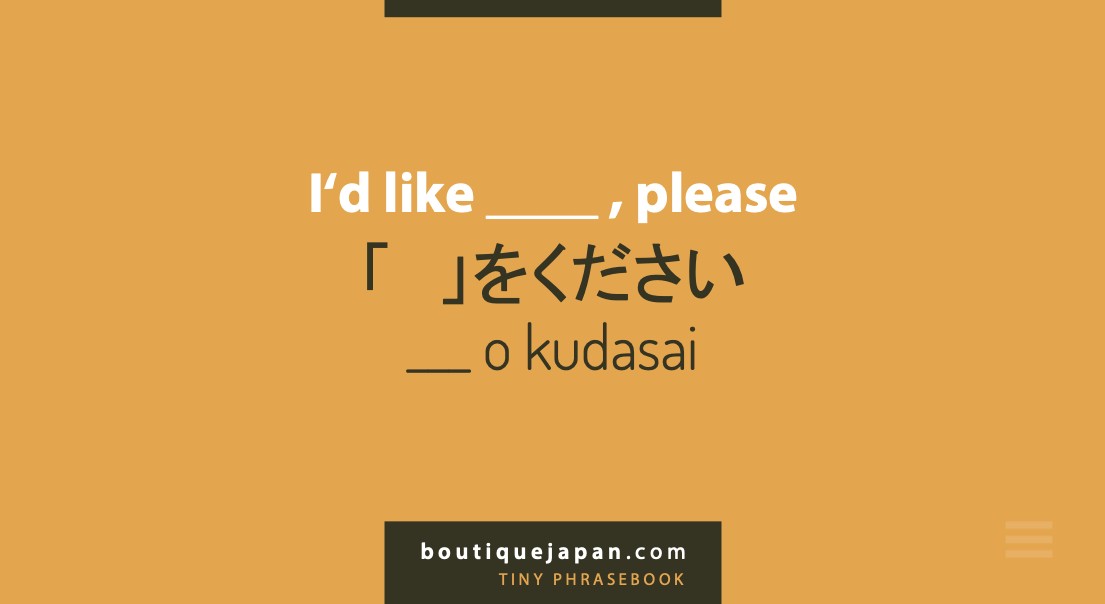 Hand giving money and saying Kudasai
Hand giving money and saying Kudasai
2.5. __ wa Doko Desu ka? ( __はどこですか) – Where Is __?
Knowing how to ask for directions is essential. Fill in the blank with the place you’re looking for, such as eki (station). For instance, Shinjuku eki wa doko desu ka? means “Where is Shinjuku Station?”
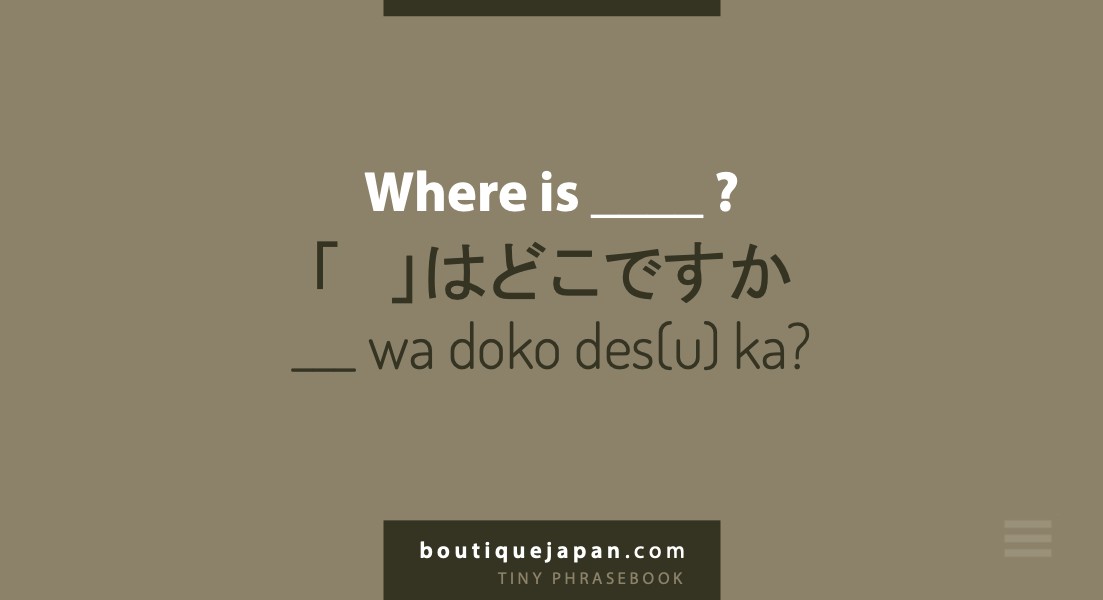 Man asking for direction and saying Doko Desu Ka
Man asking for direction and saying Doko Desu Ka
3. Eating Your Way Around Japan: Food and Drink Phrases
Japanese cuisine is a major draw for many travelers. These phrases will enhance your dining experiences, from sushi restaurants to traditional pubs.
3.1. Itadakimasu (いただきます) – An Expression of Gratitude Before Eating
Saying itadakimasu before a meal expresses humility and gratitude for the food. While not mandatory, it’s a polite gesture appreciated by the Japanese.
 People saying Itadakimasu before eating
People saying Itadakimasu before eating
3.2. Omakase de (お任せで) – Chef’s Recommendation
Ordering omakase de means entrusting the chef to choose your meal, perfect for adventurous eaters. It’s especially popular at sushi restaurants.
 Sushi chef preparing Omakase
Sushi chef preparing Omakase
3.3. O-sake (お酒) – General Term for Alcohol
In Japanese, osake refers to alcoholic beverages in general. To specifically order Japanese rice wine, ask for nihonshu.
 Bottles of Osake
Bottles of Osake
3.4. Nihonshu (日本酒) – Japanese Sake
Nihonshu is the term for traditional Japanese rice wine, distinguishing it from other alcoholic beverages.
3.5. Kinen Seki (禁煙席) – Non-Smoking Seat
If you prefer a smoke-free environment, ask for kinen seki in restaurants or other establishments where smoking is permitted.
 Sign for Kinen Seki
Sign for Kinen Seki
4. Time-Related Phrases in Japanese
Knowing how to ask about time and dates can be incredibly useful during your travels.
4.1. Ima Nanji Desu ka? (今何時ですか) – What Time Is It Now?
This is the standard way to ask for the current time. A simpler nanji desu ka? also works.
 Man asking Ima Nanji Desu Ka
Man asking Ima Nanji Desu Ka
4.2. Nanji ni? (何時に?) – At What Time?
This phrase is helpful when making reservations or arranging meetings. It adds clarity to your inquiries.
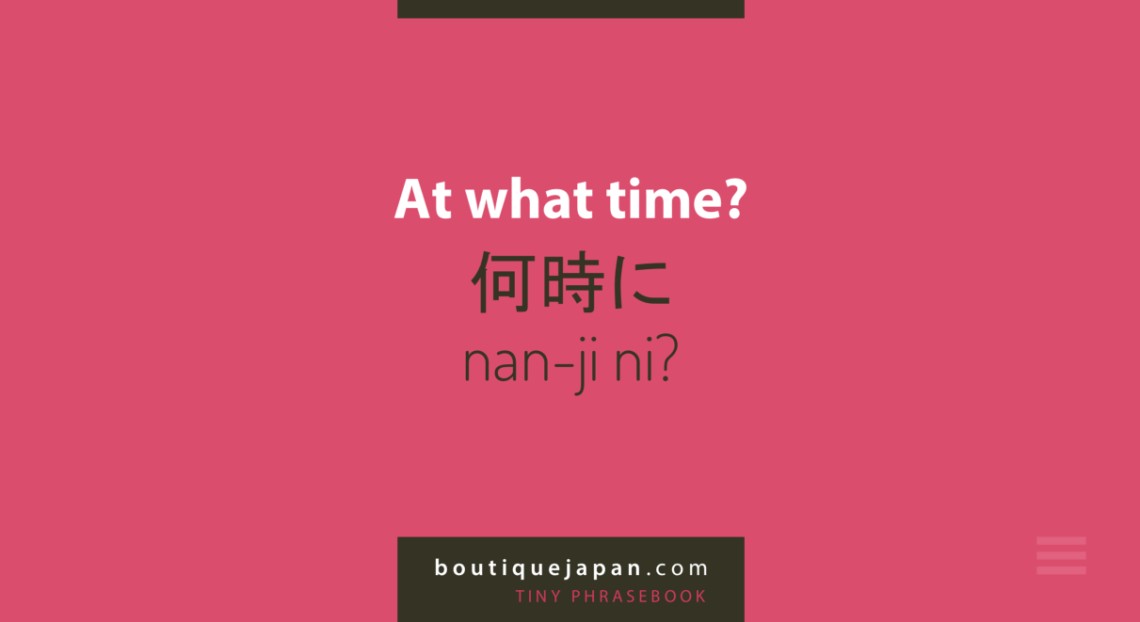 Watch showing time and Nanji Ni
Watch showing time and Nanji Ni
4.3. Asa (朝) – Morning
Asa means morning. Asagohan is a common term for breakfast.
 Sunrise in the morning with Asa
Sunrise in the morning with Asa
4.4. Kyou (今日) – Today
Knowing the word for today is useful when purchasing tickets or making plans.
 Calendar showing Kyou
Calendar showing Kyou
4.5. Ashita (明日) – Tomorrow
Ashita means tomorrow. The “i” is often silent, sounding more like “ashta”.
 Calendar showing Ashita
Calendar showing Ashita
5. Getting Around Japan: Transportation-Related Phrases
Japan boasts an efficient and easy-to-use rail network. These phrases will help you navigate trains and other modes of transport.
5.1. __ ni Ikitai ( __に行きたい) – I Want to Go to __
Ikitai means “I want to go.” Use this phrase with a location to express your desired destination, such as Kyoto ni ikitai (I want to go to Kyoto).
 Map showing Ikitai
Map showing Ikitai
5.2. Tomete Kudasai (止めてください) – Stop, Please
This phrase is particularly useful in taxis. Tomete means “stop,” and kudasai adds politeness.
 Taxi with sign saying Tomete Kudasai
Taxi with sign saying Tomete Kudasai
5.3. Kippu (切符) – Ticket
Kippu means ticket. When buying train tickets, knowing this word is essential. Osaka made no kippu o kudasai means “Ticket to Osaka, please.”
 Train Tickets with Kippu
Train Tickets with Kippu
5.4. Shinkansen (新幹線) – Bullet Train
The shinkansen is Japan’s world-famous bullet train. Enjoy the ride with a bento and some nihonshu.
 Shinkansen bullet train
Shinkansen bullet train
5.5. Dono Densha? (どの電車?) – Which Train?
If you’re unsure which train to take, ask dono densha? while showing your ticket to a staff member.
 Train platform asking Dono Densha
Train platform asking Dono Densha
6. Navigating Specific Travel Scenarios with Confidence
Let’s break down how to use these phrases in common travel situations.
6.1. At a Restaurant:
Imagine you’re at a cozy ramen shop.
- Greeting: Konnichiwa (Hello)
- Ordering: “Ramen o kudasai” (I would like ramen, please.)
- Asking for Water: “Mizu o kudasai” (I would like water, please.)
- Gratitude: Itadakimasu (before eating), Arigatou gozaimasu (after eating)
- Non-smoking: Kinen Seki o kudasai. (Non-smoking seat, please)
6.2. At a Train Station:
You’re trying to get to Osaka.
- Asking for a ticket: “Osaka made no kippu o kudasai” (A ticket to Osaka, please)
- Which train?: Dono Densha? (Which train?)
6.3. In a Taxi:
You need to get to your hotel.
- Giving the destination: (Show the address written in Japanese to the driver)
- Asking to stop: “Tomete kudasai” (Stop, please)
7. Beyond the Basics: Essential Cultural Insights
Understanding Japanese culture enhances your travel experience.
7.1. Bowing:
Bowing is a common greeting and expression of gratitude. A slight nod is usually sufficient for tourists.
7.2. Removing Shoes:
In traditional homes and some restaurants, remove your shoes at the entrance.
7.3. Gift-Giving:
When giving a gift, present it with both hands as a sign of respect.
7.4. Politeness:
The Japanese value politeness and respect. Using polite language and gestures will go a long way.
8. Overcoming the Language Barrier: Practical Tips
Even without fluency, you can navigate Japan effectively.
8.1. Pocket Wi-Fi:
Rent a pocket Wi-Fi device for easy access to translation apps and maps.
8.2. Translation Apps:
Use apps like Google Translate to communicate in real-time.
8.3. Pointing:
Don’t hesitate to point at menus, maps, or items you want to purchase.
8.4. Smiling:
A smile is a universal sign of friendliness and can bridge communication gaps.
9. Why Bother Learning Japanese?
While English is spoken in many tourist areas, learning even a few Japanese phrases can greatly improve your trip. Locals appreciate the effort, leading to warmer interactions and a more authentic experience.
9.1. Deeper Cultural Immersion
Knowing some Japanese allows you to connect with locals on a deeper level, understanding nuances and customs that might otherwise be missed.
9.2. Enhanced Travel Experience
Simple interactions like ordering food or asking for directions become more enjoyable and rewarding.
9.3. Respect for Local Culture
Attempting to speak the local language shows respect and appreciation for Japanese culture.
10. Common Misconceptions About the Japanese Language
Let’s dispel some common myths about learning Japanese.
10.1. It’s Too Difficult
While Japanese has its complexities, basic conversational phrases are relatively easy to learn.
10.2. Everyone Speaks English
While English is taught in schools, fluency is not widespread.
10.3. You Need to Be Fluent to Communicate
Even a few basic phrases can make a big difference.
11. Essential Phrases for Specific Situations
Here’s a handy guide to phrases for various situations you might encounter.
11.1. Emergency Situations:
- Help: “Tasukete!” (助けて!)
- Call the police: “Keisatsu o yonde kudasai” (警察を呼んでください)
- I’m lost: “Michi ni mayoi mashita” (道に迷いました)
11.2. Shopping:
- How much is this?: “Kore wa ikura desu ka?” (これはいくらですか?)
- Can I pay with a credit card?: “Kurejitto kaado de haraemasu ka?” (クレジットカードで払えますか?)
- I’ll take this: “Kore o kudasai” (これをください)
11.3. At a Hotel:
- Do you have any rooms available?: “Aki beya wa arimasu ka?” (空き部屋はありますか?)
- I have a reservation: “Yoyaku ga arimasu” (予約があります)
- What time is check-out?: “Chekku auto wa nanji desu ka?” (チェックアウトは何時ですか?)
12. Resources for Learning More Japanese
Ready to take your language skills to the next level?
12.1. Online Courses:
Websites like Duolingo, Memrise, and Rosetta Stone offer comprehensive Japanese courses.
12.2. Language Exchange Partners:
Connect with native Japanese speakers online for language exchange.
12.3. Travel Phrasebooks:
Carry a physical or digital phrasebook for quick reference.
12.4. Mobile Apps:
Use apps like Anki to memorize vocabulary and grammar.
13. Planning Your Trip with TRAVELS.EDU.VN
Now that you’re equipped with essential Japanese phrases, let TRAVELS.EDU.VN help you plan the perfect trip to Japan. We specialize in creating customized travel experiences tailored to your interests and preferences.
13.1. Personalized Itineraries
Our expert travel consultants will work with you to design a personalized itinerary that includes must-see attractions, hidden gems, and authentic cultural experiences.
13.2. Accommodation Recommendations
We offer a curated selection of hotels, ryokans (traditional Japanese inns), and other accommodations to suit your budget and style.
13.3. Transportation Assistance
We can assist you with booking flights, train tickets, and other transportation options, ensuring a seamless travel experience.
13.4. Local Support
Our team in Japan is available to provide assistance and support throughout your trip, ensuring your peace of mind.
14. Making the Most of Your Journey: Practical Tips
To ensure a smooth and enriching trip to Japan, keep these tips in mind:
14.1. Research Local Customs:
Familiarize yourself with Japanese etiquette to avoid unintentional faux pas.
14.2. Be Open to New Experiences:
Embrace the unexpected and be willing to try new things.
14.3. Pack Appropriately:
Consider the season and pack comfortable clothing and shoes.
14.4. Stay Connected:
Purchase a local SIM card or rent a pocket Wi-Fi device to stay connected.
15. Frequently Asked Questions (FAQ) about Japanese Phrases for Travel
Here are some common questions travelers have about learning and using Japanese phrases.
Q1: Do I really need to learn Japanese to travel in Japan?
A: No, it’s not essential, but learning a few basic phrases will greatly enhance your experience and show respect for the local culture.
Q2: What’s the most important phrase to learn?
A: “Arigatou gozaimasu” (thank you) is always appreciated.
Q3: How can I improve my pronunciation?
A: Listen to native speakers and practice mimicking their pronunciation.
Q4: Is it okay to use English in Japan?
A: Yes, especially in tourist areas, but don’t expect everyone to be fluent.
Q5: What if I make a mistake?
A: Don’t worry! Japanese people are generally understanding and appreciative of the effort.
Q6: Are there any apps that can help me translate?
A: Yes, Google Translate and other translation apps can be very useful.
Q7: Should I learn hiragana and katakana?
A: It’s helpful but not essential for basic travel.
Q8: How do I ask for help in Japanese?
A: “Tasukete kudasai” (please help me).
Q9: Is it rude to speak loudly in Japan?
A: Yes, it’s generally considered impolite.
Q10: Where can I find free Japanese lessons online?
A: Duolingo and other websites offer free introductory courses.
16. Ready to Start Planning Your Dream Trip to Japan?
At TRAVELS.EDU.VN, we’re passionate about creating unforgettable travel experiences. Let us help you plan your perfect trip to Japan, tailored to your unique interests and preferences.
Don’t let the language barrier hold you back from exploring the wonders of Japan. With a few essential phrases and the support of TRAVELS.EDU.VN, you can embark on a journey of discovery and create memories that will last a lifetime.
Contact us today to start planning your adventure:
- Address: 123 Main St, Napa, CA 94559, United States
- WhatsApp: +1 (707) 257-5400
- Website: TRAVELS.EDU.VN
Let travels.edu.vn be your trusted guide to unlocking the magic of Japan. We look forward to helping you create an unforgettable travel experience.
Reach out now and let’s discuss your dream Japan itinerary!